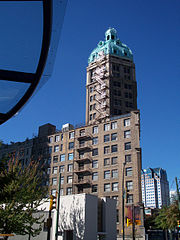L. D. Taylor
Louis Denison Taylor (July 22, 1857 – June 4, 1946) was elected mayor of Vancouver, British Columbia seven times between 1910 and 1934, serving a total of 11 years.

Born in Michigan, Taylor lived in Chicago before coming to Vancouver on 8 September 1896. He briefly participated in the Klondike Gold Rush before beginning his political career in Vancouver.
L. D. Taylor championed the issue of amalgamating South Vancouver and Point Grey with Vancouver, and oversaw a variety of public works projects in the rapidly developing city, including the opening of the airport at Sea Island and the Burrard Street Bridge. Amalgamation would take place in 1929 but not under Taylor, because he lost the 1928 election to W. H. Malkin.
Taylor ran as a friend of organized labour, although he opposed labour militancy and Communists, who had become quite active in the 1930s in Vancouver, notably for their agitation amongst the unemployed.

Mayor Taylor's political career immeasurably benefited from his other role as a newspaperman. He began in the trade working for the Vancouver Daily Province before buying the Vancouver World. The building he had constructed for his newspaper was later taken over by the Vancouver Sun and remains a landmark building in the city, known today as the Sun Tower. Taylor eventually was forced to sell the paper, but not before using it as a political platform from which he railed against Chinese immigration, big business, and other issues of the day that helped establish his reputation as a populist leader.
Despite his popularity at the polls, Taylor often found himself mired in controversy. In particular, an exhaustive 1928 inquiry into allegations of corruption in the police department and city hall revealed that he had associations with known vice operators in the city. Although he was cleared of any criminal wrongdoing, the inquiry blamed his "open town" policy on the proliferation of vice and crime in Vancouver. Mayor Taylor claimed that he had no intention of running a "Sunday School town," and argued that police resources should be spent on major crimes, not victimless vice crimes. This was the basis for Gerry McGeer's 1934 electoral campaign, which obliterated Taylor's political career with the largest electoral defeat Vancouver had ever seen. McGeer was an old adversary of Taylor, having been the lead attorney prosecuting the 1928 police inquiry, and claimed in his campaign that he would eliminate the crime and corruption that flourished under Taylor's civic administration. Taylor unsuccessfully contested several more elections, but spent the rest of his life bitter about the 1934 election. A recent biography on Taylor reveals that his initial reason for traveling to Vancouver was because he was a fugitive, fleeing a fraud investigation stemming from his former job in a Chicago bank; he successfully kept this a secret during his life in Vancouver.
References
- Francis, Daniel (2004). LD: Mayor Louis Taylor and the Rise of Vancouver. Vancouver, British Columbia, Canada: Arsenal Pulp Press. ISBN 1-55152-156-3.
- Mackie, John (30 November 2002). "The mayors of Vancouver". The Vancouver Sun. p. B4.
{{cite news}}: External link in|title=
- Marquis, Greg, “Vancouver Vice: The Police and the Negotiation of Morality, 1904-1935,” Essays in the History of Canadian Law: Volume VI British Columbia and the Yukon. Hamar Foster and John McLaren, eds. Toronto: University of Toronto Press, 1995. ISBN 0-8020-0789-9
External links
- Daniel Francis, excerpt from "L. D.: Louis Taylor and the Rise of Vancouver," Vancouver Courier, 5 August 2004. Retrieved 15 November 2006.
- Donna Jean McKinnon, "Mayors of Vancouver," History of Metropolitan Vancouver. Retrieved 24 August 2006.
